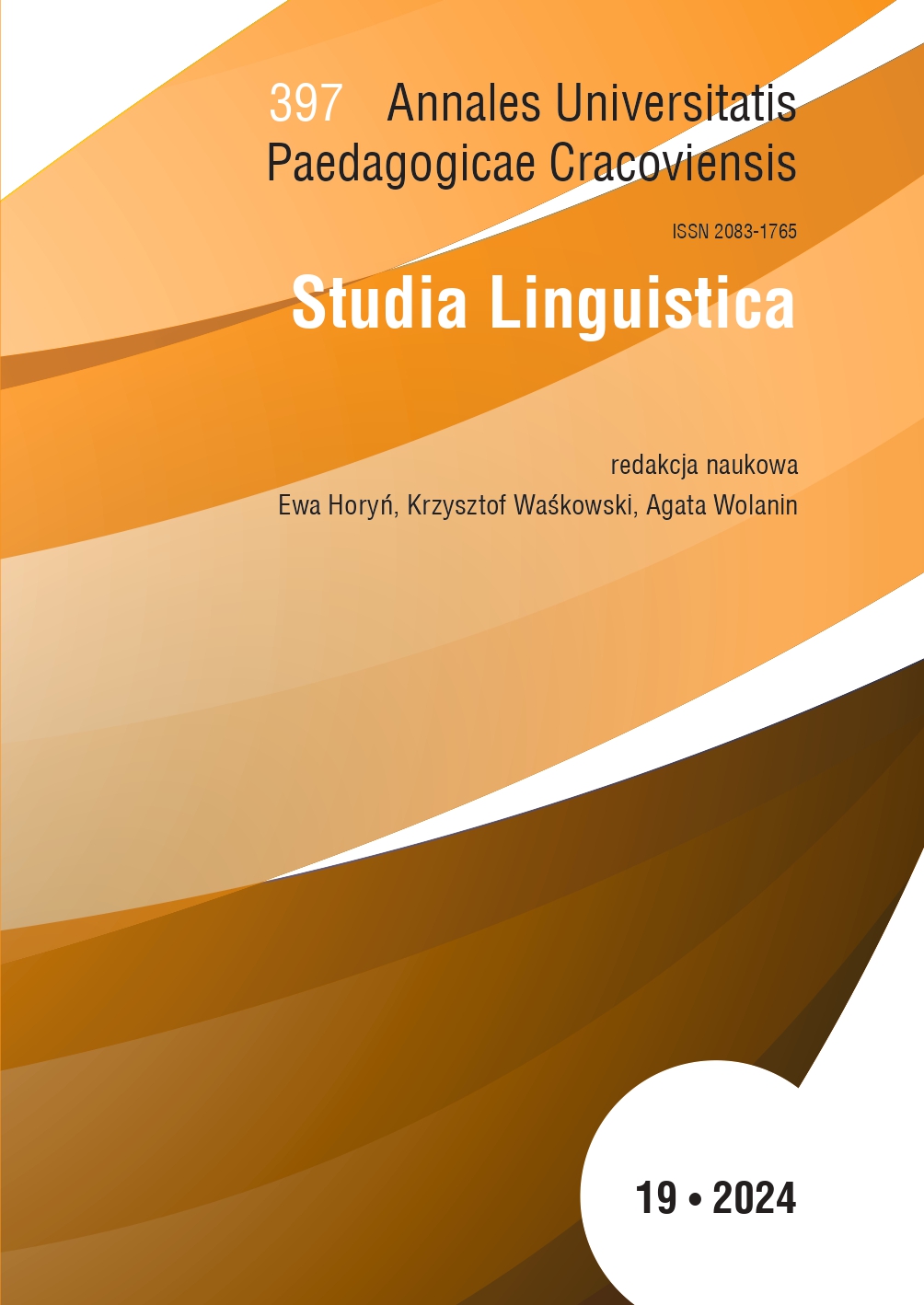The techniques of introducing English acronyms in the Polish medical texts: a corpus-based study
Main Article Content
Abstract
The paper outlines the research on the usage of English borrowings, specifically acronyms, in the Polish medical language. The raw data is presented alongside a discussion about the findings and their implications. The research was conducted manually, with the assistance of basic electronic tools, on a personally prepared corpus consisting of an annual run of Kurier Medyczny, a journal that covers general medical topics. The analysis included the techniques of introducing the borrowed acronyms to the readers, their general meanings, as well as data related to their frequency within the corpus.
Downloads
Article Details

This work is licensed under a Creative Commons Attribution-NonCommercial-NoDerivatives 4.0 International License.
Author, submitting a text to the editorial board of the journal “Annales Universitatis Paedagogicae Cracoviensis. Studia Linguistica", certifies that the content of the article has not been published so far and that the work does not violate in any way the copyright or related rights of other person, as well as other rights of third parties, and that no one's rights to the work (or any part thereof) have been missed. After signing the contract, the property rights to the published materials are transferred to the Scientific Publisher of the University of the National Education Commission, Krakow.
“Annales Universitatis Paedagogicae Cracoviensis. Studia Linguistica” is an open access journal, and all its content is made available free of charge to users and institutions under the Creative Commons CC-BY-NC-ND 4.0 license (attribution, non-commercial use, no derivative works). Under this license, the authors agree that their work may be lawfully reused for any purpose, except for commercial purposes, without the prior consent of the author or publisher. Everyone can read, download, copy, print, distribute and process these works, provided that the author's marking and the original publication place are correct. Published texts may not be used to create derivative works (e.g. to translate and publish in another language without the consent of the publisher). This is in line with the BOAI (Budapest Open Access Initiative) definition. "Studia Linguistica" does not charge for submitting or processing articles.
References
Bauer L., 1998, Is there a class of neoclassical compounds, and if so is it productive?, “Linguistics” 36, no. 3.
Google Scholar
Baum S.V., 1962, The acronym, pure and impure, “American Speech” 37.
Google Scholar
Booij G.E., 2005, The grammar of words: An introduction to linguistic morphology, Oxford.
Google Scholar
Cannon G., 1989, Abbreviations and acronyms in English word‑formation, “American Speech” 64, no. 2.
Google Scholar
Crystal D., 2018, The Cambridge Encyclopedia of the English Language, Bangor.
Google Scholar
Davenport B., 1943, Initials into words, “American Notes and Queries” 2.
Google Scholar
Fleischman S., 2003, Language and medicine, [in:] The handbook of discourse analysis, edited by D. Tannen, Oxford, pp. 470–502.
Google Scholar
Grabias S., 1997, Język w zachowaniach społecznych, Lublin.
Google Scholar
Grucza F., 2002, Języki specjalistyczne – indykatory i/lub determinanty rozwoju cywilizacyjnego, [in:] Problemy technolingwistyki, edited by J. Lewandowski, Warszawa, pp. 9–26.
Google Scholar
Grucza S., 2006, Komunikacja specjalistyczna a idiokontekst specjalistyczny i konsytuacja specjalistyczna, [in:] Glottodydaktyka i jej konteksty interkulturowe, Studia Rossica XVIII, edited by A. Wołodźko‑ Butkiewicz, W. Zmarzer, Warszawa, pp. 209–223.
Google Scholar
Grucza S., 2008, Lingwistyka języków specjalistycznych. Języki. Kultury. Teksty. Wiedza, Warszawa.
Google Scholar
Górnicz M., 2003, Terminologia tekstów specjalistycznych, [in:] Lingwistyczna identyfikacja tekstów specjalistycznych, edited by B.Z. Kielar, S. Grucza, Warszawa, pp. 106–117.
Google Scholar
Haugen E., 1950, The analysis of linguistic borrowing, “Language” 26, pp. 210–231.
Google Scholar
Mosman J., 1993, Dictionary of abbreviations acronyms and initialisms, Gale.
Google Scholar
Pilegaard M., 2000, Introduction, “HERMES. Journal of Language and Communication Studies” 13 (25), pp. 7–9.
Google Scholar
Perlińska L., Krzyżowski J., 2008, Medical slang & acronyms, Warszawa.
Google Scholar
Quirk R., Greenbaum S., Leech G., Svartvik J., 1985, A comprehensive grammar of the English language, London – New York.
Google Scholar
Szulc A., 1984, Podręczny słownik językoznawstwa stosowanego, Warszawa.
Google Scholar
Warner R., 1976, The relationship between language and disease concepts, “International Journal of Psychiatry in Medicine” 7, pp. 57–68.
Google Scholar
Weinreich U., 1953, Languages in contact, The Hague.
Google Scholar
Wilkoń A., 1987, Typologia odmian językowych współczesnej polszczyzny, Katowice.
Google Scholar
Witalisz A., 2016, Przewodnik po anglicyzmach w języku polskim, Kraków.
Google Scholar
